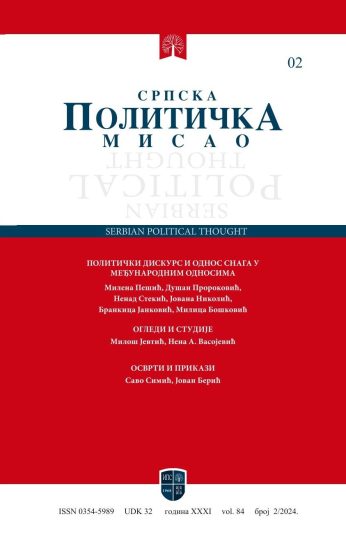CHALLENGES AND DILEMMAS OF CONTEMPORARY DEMOCRACY
CHANTALLE MOUFFE’S POLITICS OF RADICAL DEMOCRACY
Abstract
In this article the author critically reflects upon contemporary
democratic theory of Chantal Mouffe – outlined in works such as The
Democratic Paradox, The Return of the Political and Hegemony and
Socialist Strategy – most notably focusing on her conception of radical
democracy as politics of agonism vs. antagonism. In the first part of
the essay, the issue of the paradoxical nature of contemporary liberal
democracy is placed forward, as well as the theoretical and practical
question about the establishment of the so-called consensual politics
of the centre and “third way” politics which undertook the name of
“social-democracy”. Mouffe rightly emphasizes the difference between
two philosophical, historical and political traditions, namely, between
the principle of popular sovereignty, on the one hand, and the idea of
human and individual rights on the other, concluding that their encounter
has been a matter of historical contingency. In this light, the concept
of the democratic paradox is articulated, first of all, as the mutual
exclusion of these principles among themselves. In the second part of
the article, through Mouffe’s dialogue with authors such as Schmitt,
Rawls, Habermas and Wittgenstein, the relations between power and
pluralism i.e., between otherness and conflict are addressed – with the
focus on the idea of conflict as the nature of politics itself. Rethinking
the difference between the concept of the political and the concept of
politics, the author analyzes Mouffe’s suggestion about substituting the
concept of the enemy with the concept of the adversary, which results
from her concern as how the role of power and violence can be both
reduced and institutionalized. It is argued that the philosophically
inspiring and multi-level discourse of hegemony that Mouffe presents
nonetheless faces itself with structural problems i.e., that perpetual
insistence on affirmation of the liberal-democratic framework annuals
the very idea of politics of difference as well as of democracy as such
in a self-contradictory manner. Most notably, while Mouffe’s position
was conceptualized in a way of a deconstructive and/or poststructural
anti-essentialism, it ends up precisely as a totalizing comprehension,
that is, in an almost metaphysical grounding of “the other of the same”,
as well as in exclusion, and all this in the name of “common ground”
which leads political passion in a new “democratic design”. This
“design”, however, is one of an anthropological pessimism coming
from a perspective of a bellum omnium contra omnes. Moreover, such
exclusion, in an act of political decision, rejects original political and
social otherness, irreducible difference, divergent interpretations and
irreplaceable plurality i.e., the whole field of the “constitutive outside”
as the core of democracy and the political per se.
References


